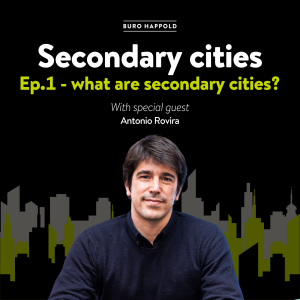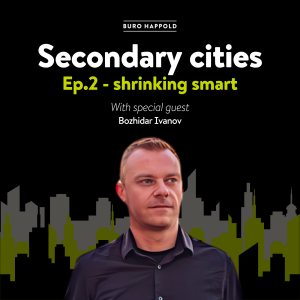Secondary Cities, Primary Opportunities - A Podcast By Urban C:lab
This limited 5 episode podcast series delves into the often-overlooked yet crucial role of secondary cities in global economic development. Despite housing the majority of the world’s population and generating a significant portion of global GDP, these cities face unique challenges such as population decline, lack of investment and inadequate infrastructure. Our series aims to shed light on these issues and explore innovative solutions to help secondary cities thrive. We spoke to a diverse range of experts from around the world, from urban development practitioners and architects to academic researchers and humanitarian aid workers. Each episode features their insights, offering a comprehensive look at the multifaceted challenges and opportunities these cities encounter. Join us as we investigate how secondary cities can navigate demographic, economic and environmental hurdles to achieve sustainable growth and improved quality of life. This podcast series is part of Urban C:lab, Buro Happold’s space for exploring big questions and emerging challenges in the built environment. C:lab brings together people from across the practice to think differently, work across disciplines, challenge ideas and explore topics that don’t always get the attention they deserve. It’s deliberately collaborative, open-ended and focused on action as much as ideas.
Episodes

Wednesday Apr 16, 2025
Wednesday Apr 16, 2025
This episode sets the scene for the podcast series. The Cities Alliance defines a secondary city as: “One that falls outside of the primary urban core of the country. Ranging in population from 100,000 to 500,000 inhabitants but this can vary greatly depending on the country’s context”.
Antonio challenges the concept by renaming them ‘intermediary cities’. Cities that fall within the urban hierarchy between the primary cities and very rural areas. He highlights how critical they are in the world context and how local economic development to achieve a more balanced territorial distribution of growth is key.
Regional development and territorial equity should be at the forefront in the urban development realm. Antonio has developed research on intermediary cities in Sub-Saharan Africa, identifying the problems that rapid unplanned growth generates. Cities spend a lot of money to produce planning guidance and regulation but often they are unimplementable. This is one of the biggest challenges that intermediary cities in developing countries face.

Wednesday Apr 16, 2025
Wednesday Apr 16, 2025
This episode focuses on the concept of shrinking smart, a term which refers to strategies and approaches that are used by cities experiencing population decline to manage and adapt to their changing circumstances effectively.
To unpack this complex topic, we are joined by an expert in the field, Dr. Bozhidar Ivanov, an urban researcher and research project manager at Erasmus University Rotterdam. Bozhidar has dedicated his PhD to the topic, researching policy and planning alternatives to address urban shrinkage and population decline through cross-national comparative studies of approaches from Spain, Germany and the Netherlands.
Instead of trying to reverse population loss, this strategy emphasises adapting to it by optimising resources, infrastructure and services to fit the smaller population. How can we turn population decline and its associated challenges into opportunities? Can cities be ‘successful’ without a focus on growth?

Tuesday Apr 22, 2025
Tuesday Apr 22, 2025
This episode explores the complex problem migration presents in origin and receptor cities by acknowledging the intensified migration already underway in conflict areas and regions affected by climate change and highlighting the need to adjust the language we use to describe migration.
Norma and Sarah share their experiences from both their academic research and onsite operational perspectives. They explore the misconceptions and polarised conversations around the causes and effects of migration across the globe and how this can stigmatise communities.
In addition, they discuss how we can foster the reception and integration of migrants into secondary cities, emphasising the need to preserve their fundamental right to self-agency. Whilst Norma and Sarah identify the positive impact migrants can have on communities, they also caution against romanticising this impact as it can be detrimental.

Wednesday Apr 23, 2025
Wednesday Apr 23, 2025
This episode discusses the challenges and opportunities of implementing climate resilience and adaptation measures in secondary cities. These cities often operate under limited resources and with financial constraints.The focus of the episode is on Sub-Saharan Africa and India. Cities in the region are fast growing and face severe consequences resulting from climate change and extreme weather events. Many of these climate-related risks are even more acute in secondary cities, which are often overlooked on the national and global scale. Here poor planning and underinvestment intersect with lower incomes to reduce resilience.
In the episode we explore how secondary cities can balance the need for rapid climate action with the need to ensure social equity and economic development in their policy implementation. We also explore the importance of city-to-city partnerships and the opportunities arising from programmes such the Global Covenant of Mayors which support capacity building in secondary cities, especially in terms of access to climate finance and infrastructure development.
Please note, the views expressed by the guests in this podcast are personal only.

Thursday May 01, 2025
Thursday May 01, 2025
This episode explores how culture and the arts can spark regeneration in secondary cities. From repurposing abandoned spaces to strengthening community identity, we examine how cultural initiatives can breathe new life into urban areas. While flagship projects like Bilbao’s Guggenheim have transformed cities, we discuss the challenges of sustainability and whether such approaches truly benefit local communities.
We also dive into cultural planning – an alternative grassroots-driven approach that prioritises community involvement and long-term resilience. The conversation highlights the risks of imposing a fixed cultural identity on a city and the importance of embracing diverse, evolving urban cultures.
Through real-world examples from across Europe, we consider what makes cultural regeneration successful and explore how cities can integrate arts and culture into their development strategies in a way that is both inclusive and impactful.





